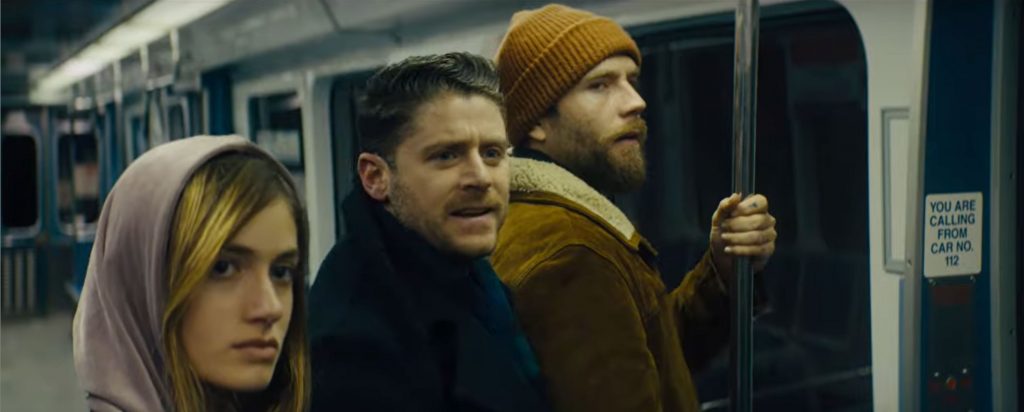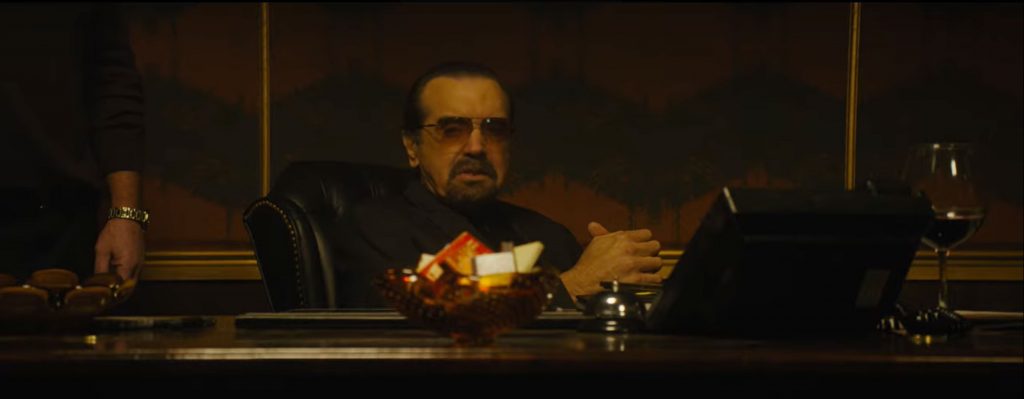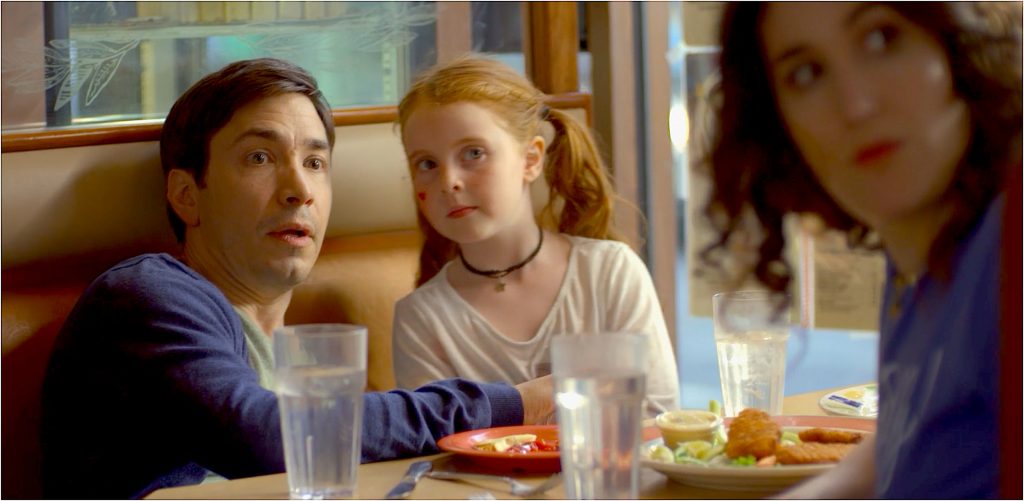April 3, 2020
by Carla Hay

Directed by Jon Abrahams
Culture Representation: Taking place in an unnamed big city in the U.S., the campy crime drama “Clover” has a predominantly white (with some African American and Native American representation) cast of characters involved in the criminal underworld.
Culture Clash: Two Irish American brothers who owe $50,000 to an Italian American crime boss go on the run when they get blamed for the death of the crime boss’ only son, and a teenage girl gets involved in their shenanigans.
Culture Audience: “Clover” will appeal mostly to people looking for a very lowbrow crime caper for escapist entertainment.

The title of the campy crime drama “Clover” is kind of misleading, because the title character—a teenage girl named Clover—isn’t the main character of the story, and she doesn’t show up until 23 minutes into this 101-minute movie. “Clover” is really about the bickering Irish American fraternal twin brothers who are at the center of the movie and whose actions propel almost everything that happens in the story.
Mickey (played by Jon Abrahams, who directed “Clover) and Jackie (played by Mark Webber) are the owners of a seedy bar, which they inherited from their late father. Their mother has also passed away. From the get go, viewers see that the brothers are complete opposites and they don’t get along with each other. Mickey is the responsible brother who has more common sense, while Jackie is the screw-up brother who makes a lot of dumb decisions.
One of these dumb decisions is Jackie losing $50,000 in a blackjack game, when the money was supposed to go to repaying a debt that the brothers owe to local crime boss Tony Davallo (played by Chazz Palminteri, in yet another gangster role). When Mickey finds out, he and Jackie into a knock-down, drag-out fight before heading to Tony’s lair (a bar located in the basement of a bowling alley) to tell him that they don’t have the money and hope that they don’t get assaulted or worse by Tony’s goons.
Tony is every bit the stereotypical crime boss that’s been portrayed in dozens of movies and TV shows. He’s angry that the brothers don’t have his money, but he makes them a deal: He’ll erase the debt if Mickey and Jackie accompany Tony’s only son Joey (played by Michael Godere) to collect a debt from another deadbeat, who owes $80,000 to Tony.
Of course, it’s not as simple as just collecting a debt. Mickey knows it, and senses that they’re about to get involved in a violent crime, even though Joey (a cocaine-snorting thug) not very convincingly denies it. Mickey tries to talk his way out of going, but he and Jackie don’t have much of a choice, so they go with Joey and break into the man’s home.
The guy who owes Tony the $80,000 debt is named Barry (played by Sky Paley), and he’s surprised by this late-night break-in. In short order, Barry is brought down to a basement, tied up, and beaten by Joey, who then shoots and kills Barry, as horrified Mickey and Jackie look on. A fight ensues because the brothers don’t want to be involved in a murder. Joey loses his grip on his gun, and the next thing you know, Joey is shot dead by a girl wearing a hoodie, who says she’s Barry’s 13-year-old daughter Clover.
Mickey and Jackie know that Tony will blame them for Joey’s death. Meanwhile, Clover (played by Nicole Elizabeth Berger) thinks that Mickey and Jackie killed Barry, even though they tell her that Joey really committed the murder. Clover doesn’t seem to know what’s the truth. So, in order for her not to go to the police, Mickey and Jackie force Clover to go on the run with them, which takes up nearly the rest of the movie. And where is Clover’s mother? She tells Jackie and Mickey that her mother is dead, but that might or might not be true.
“Clover” is the type of silly “mobsters are after us” movie that has a lot of gun shootouts where people corner each other with guns, but then stand around talking and insulting each other before anyone actually starts shooting. Mickey, Jackie and Clover’s panicky race to outrun and hide from Tony and his henchmen take them to different places during the course of the movie.
The first place they run to is a bar owned by a tough-as-nails family friend named Pat (played by Tichina Arnold), where they barely escape when Tony’s thugs catch up to them there. Somehow, Mickey (who’s supposed to be the smart brother) is shocked that the thugs would think of tracking them down at the bar, even though it’s owned by a known family friend of the brothers. Yes, it’s not a good idea to try and hide at the most obvious places.
Another hideout that the brothers try is the apartment of Jackie’s ex-girlfriend Angie (played by Jessica Szohr). She’s reluctant to help them at first, but she takes pity on Clover. Angie also still has feelings for dimwitted Jackie (of course she does), so that’s why Angie ends up driving with all of them in her car to go where they need to go. They also stop along the way at the home of their childhood friend Stevie (played by Johnny Messner), a cop whose father co-founded the bar with the father of Mickey and Jackie.
For people who are trying to lay low and hide, they sure are hopping all over town. Mickey, Jackie, Clover and Angie then end up in an abandoned train station (where the pace of the movie starts to drag for a while), which is the scene of another unrealistic shootout. And then there’s another stop, this time at an abandoned warehouse occupied by Mickey and Jackie’s loopy cousin Terry (played by Jake Weber), who has escaped from a psychiatric institution. The scenes with Terry have the best comedy in the movie, which isn’t saying much because “Clover” isn’t exactly a treasure trove of clever and funny dialogue.
Also in the mix are female assassins Gertie (played by Erika Christensen) and Virginia (played by Julia Jones), a lesbian couple who argue over things like whether or not coal fire or wood fire is better for making pizza or burning bones. Gertie and Virginia are hired by Tony to find Mickey and Jackie. They are ruthless, cold and calculating—making them possibly more dangerous than Tony’s bumbling thugs.
And there’s another character, who’s seen only in the beginning and end of the film: a mysterious wealthy guy named Mister Wiley (played by Ron Perlman, who clearly had fun hamming it up with this over-the-top character) whose connection to the story is made clear at the very end. The only thing that viewers really see of Mister Wiley in the beginning is that he’s a mean-spirited control freak who yells at a house employee for entering a meeting room he’s in when the door was closed. He also says things like, “The pecking order must not be disrupted or else we will have chaos.”
To its credit, “Clover” doesn’t take itself too seriously, but the screenplay by Michael Testone is still so awful (including the story’s big plot twists) that viewers might find themselves laughing at scenes that weren’t really intended to be funny. “Clover” takes place in the present day, but it also tries to have a 1970s vibe. The soundtrack tunes from little-known artists such as Charles Bradley and El Michels Affair try to evoke the same aura as gritty crime movies that Al Pacino or Pam Grier would’ve starred in the mid-1970s. However, the ’70s-styled retro music choices would work better for a movie that’s more authentic than “Clover” is, because “Clover” is about as realistic as a “Ren & Stimpy” cartoon.
With “Clover,” Abrahams shows that he can capably direct himself in a movie—he’s the best actor out of the characters who are on the run from crime boss Tony—and the action scenes are adequate, but they’re often ruined by the terrible and corny dialogue. The well-known veteran actors in the cast don’t really add much substance, because they’re playing character types they’ve played many times before—”angry crime boss” for Palminteri; “menacing villain” for Perlman; and “tough-talking woman” for Arnold.
As bad as “Clover” is, it isn’t the worst movie someone can see all year—and that’s mostly because the film’s main actors are at least compatible with their roles. The movie’s appeal certainly isn’t in its poorly written, clunky screenplay that tries to throw in a few curveballs to make it look a lot smarter than it really is. “Clover” is the kind of movie that people can watch if they’re extremely bored and want to see a movie where intelligence is not required.
Freestyle Digital Media released “Clover” on digital and VOD on April 3, 2020.

